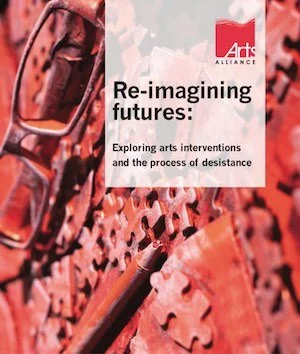Desistance and Arts in the Criminal Justice System
Arts Alliance have produced a robust and fascinating research report entitled ‘Re-Imagining Futures: Exploring arts interventions and the process of desistance.’ Below is a condensed version of their findings, that we at Vital Beats find both encouraging and essential reading for anyone interested in the impact that the Arts have in the Criminal Justice System.
The arts can easily be caricatured as a fluffy non-essential. To overcome that caricature, those of us who believe that creativity is vital to human development, and who know from experience that the arts are uniquely powerful as a means of transforming lives, often need objective evidence to make the case.
This research, along with the growing body of evidence, suggests there are strong reasons to consider arts in Criminal Justice an area of considerable significance and innovation. Arts practice aims to bring about a positive affect experience in the participant (Parkes & Bilby, 2010). The affective experience, which can include a sense of community cohesion, that time is passing at a different pace, or an improved feeling of self-satisfaction and achievement, can be linked to desistance from crime. (“Desistance” is the process of personal growth through which offenders become non-offenders.)
Key findings
This piece of research demonstrates a clear link between taking part in arts- based activities and the movement towards secondary desistance. It identifies the importance of arts practice for the participants and shows what types of outcomes successful projects should be producing. The research also highlights the importance of collecting qualitative as well as quantitative data on arts projects and their participants when measuring these changes. Analysis of the data across all five projects produced the following key findings:
Participation in arts activities enables individuals to begin to redefine themselves, an important factor in desistance from crime.
Arts projects facilitate high levels of engagement. This is significant because many individuals in contact with the Criminal Justice System have struggled to engage with productive activities in the past. Participants must engage in order to be able to redefine themselves. Engagement in arts projects has also been shown to lead to greater participation in education and work-related activities.
Arts projects can have a positive impact on how people manage themselves during their sentence, particularly on their ability to cooperate with others – including other participants and staff. This correlates with increased self-control and better problem-solving skills.
Engagement with arts projects facilitates increased compliance with criminal justice orders and regimes.
Arts projects are responsive to participants’ individual needs. Current policy documentation on commissioning services to meet offenders’ needs highlights the importance of responsiveness in meeting diverse needs.
Arts projects are particularly successful in improving cooperative and communication skills and self-confidence, which are important in the job market. Personal and social education projects are well placed in the last 12 months of offenders’ sentences, rather than focusing only on vocational skills, which may not value fundamental growths in confidence for example as preparation for life ‘outside’.
The review of offender skills ‘Making prisons work: Skills for rehabilitation’ states:
We recognise the important role that the arts, collectively, can play in the rehabilitation process through encouraging self-esteem and improving communication skills as a means to the end of reducing reoffending. Future employment or self employment in, or associated with, the creative arts and crafts can for some represent a potential pathway to life free of crime. (BIS & MoJ, 2011: 19).
The relationship between the creative arts and the Criminal Justice System has been relatively under researched and under-evaluated (McLewin, 2011), despite having a long and complex history (Cox and Gelsthorpe, 2012). There are strong reasons to consider arts in Criminal Justice an area of considerable significance and innovation. The value of engaging prisoners in purposeful activity has long been recognised, and is part of the criteria against which prisons are assessed by the inspectorate. Similarly, the goals of HM Prison Service include the duty to look after prisoners with humanity, as well as rehabilitating offenders to lead crime-free lives. A number of reports (for example, Hughes, 2005; Arts Alliance, 2010), have noted that arts-based interventions seem very effective in producing what are often called ‘soft outcomes’, for example higher levels of reported self-esteem and positive self-image, and improvements in social skills and relationships. These elements help support social bonds and the development of social capital, which are thought to be essential in the journey to desistance (Farrall, 2004). Participating in arts-based activities also seems to lead to a greater openness to other kinds of educational courses and attainment (Hughes, 2005; Caulfield, Wilson & Wilkinson, 2009; Anderson, et al, 2011). Research suggests that all the things arts activities support – higher levels of self- esteem, improved relationships and the maintenance of bonds with family, and improved levels of educational attainment – are linked to a reduction in reoffending.
“Music can unlock something in people and help them to address other things head on. I don’t for one-minute think that we can change the world. It’s about building up their self-esteem, and about helping them to remember what it’s like to succeed again.” (Music in Prisons.)
The findings clearly demonstrate how the arts activities undertaken by participants provided the medium through which they were able to reflect upon their own self. In this sense, the art facilitated reflection, leading to changes in self-perception, and potentially changes in behaviour. Environments and programmes designed to focus specifically on redefining the self – such as therapeutic communities – typically do this work over many months and years. What is clear from the findings presented here is that participants in these arts projects were experiencing these outcomes over a much shorter time. We suggest that the space for reflection created through the artistic process is one of the most significant factors in promoting this change. In all the projects evaluated, all of the participants talked about the enjoyment that they gained from taking part. This is possibly a difficult notion to manage in a Criminal Justice System which places great value on economically valuable activity and ‘proper punishment’. However, enjoyment and wellbeing are linked, which is important in a system that needs to address the high levels of mental and physical ill-health and the associated costs of these. Enjoyment, in fact, can be considered a turning point for change.
This research demonstrates that participants acknowledge the impact that taking part in arts activities has on their personal agency in the short term. Changes to personal agency, or efficacy and identity, are linked to desistance. The full report may be downloaded from Arts Alliance Evidence Library here: Re-Imagining Futures: Exploring arts interventions and the process of desistance.

